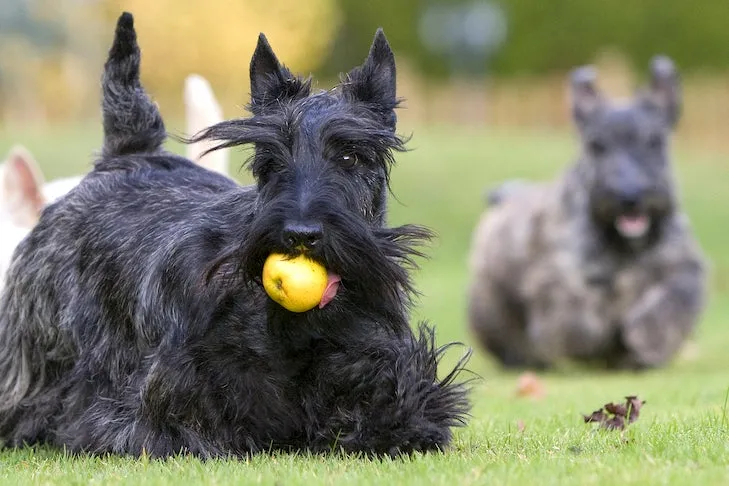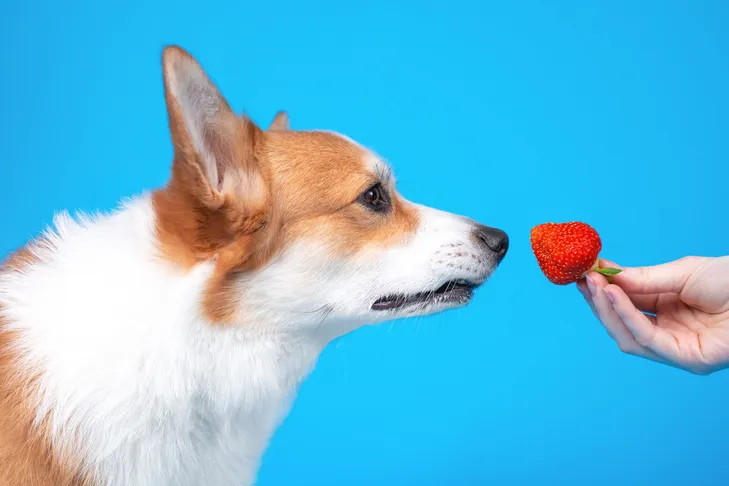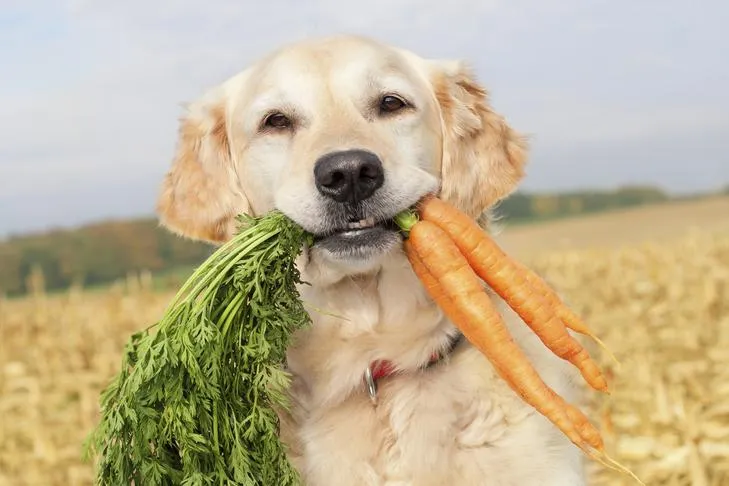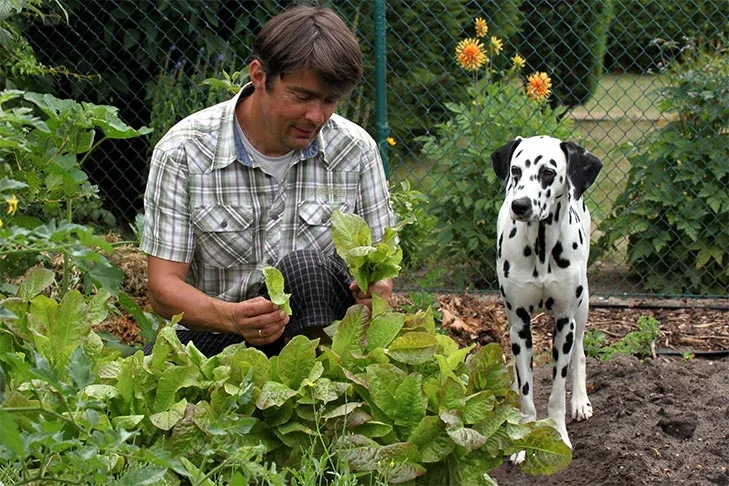Sharing your favorite human snacks with your canine companion is a common desire for many pet owners. While it’s tempting to think that if it’s safe for you, it’s safe for your dog, this isn’t always the case. Dogs digest food differently than humans, and certain fruits and vegetables can be unhealthy or even dangerous for them. Understanding what food is ok for dogs to eat is crucial for preventing long-term health problems and, in extreme cases, even fatalities. While dogs, as omnivores, don’t strictly require fruits or vegetables in their diet, offering dog-safe varieties as occasional treats can be a healthy and enjoyable practice.
This comprehensive guide will help you distinguish between fruits and vegetables that are safe to share in moderation and those that should be strictly avoided to ensure your dog’s well-being.
Fruits Dogs Can Enjoy in Moderation
Many fruits, when given appropriately and in moderation, can be wholesome and delicious treats for dogs, offering essential vitamins, minerals, and antioxidants. Remember to always remove pits, seeds, and tough rinds where indicated.
Apples
Apples are an excellent source of vitamins A and C, along with fiber. Their low protein and fat content make them an ideal snack for senior dogs. Always remove the seeds and core, as apple seeds contain small amounts of cyanide. Frozen apple slices can be a refreshing treat on warm days.
 Scottish Terriers enjoying playtime in a grassy field.
Scottish Terriers enjoying playtime in a grassy field.
Bananas
These are a fantastic low-calorie treat for dogs, rich in potassium, vitamins, biotin, fiber, and copper. Bananas are also low in cholesterol and sodium. However, due to their high sugar content, they should be given sparingly as a treat rather than a regular part of their diet.
Blueberries
Considered a superfood, blueberries are packed with antioxidants that help prevent cell damage in both humans and canines. They also provide fiber and phytochemicals. Their small size makes them great for training rewards or for teaching your dog to catch treats.
Cantaloupe
Cantaloupe is nutrient-dense, low in calories, and an excellent source of water and fiber. Its high sugar content, however, means it should be offered in moderation, particularly for dogs that are overweight or have diabetes. Freezing cubes can create a delightful summertime snack.
Cranberries
Both fresh and dried cranberries are safe for dogs in small amounts. While some dogs might not enjoy their tartness, moderation is key to avoid stomach upset. Be aware that many dried cranberries for human consumption are sweetened; opt for unsweetened fresh or frozen varieties to avoid unnecessary sugar in your dog’s diet.
Cucumbers
Cucumbers are particularly beneficial for overweight dogs as they contain minimal carbohydrates and fat, offering hydrating satisfaction. They are loaded with vitamins K, C, and B1, as well as potassium, copper, magnesium, and biotin. Chilled or frozen cucumber slices make an excellent hot-weather treat.
 A Russell Terrier with cucumber slices on its face, looking humorous.
A Russell Terrier with cucumber slices on its face, looking humorous.
Mango
This sweet, juicy tropical fruit is a powerhouse of vitamins A, B6, C, and E, along with potassium and both beta-carotene and alpha-carotene. As with most fruits, the hard pit must be removed as it contains small amounts of cyanide and poses a choking hazard. Mango is high in sugar, so use it as an occasional treat, especially for dogs prone to weight gain.
Oranges
Oranges are generally safe for dogs, though many dogs may be deterred by their strong citrus scent and taste. They are a good source of vitamin C, potassium, and fiber. Only offer the juicy flesh in small quantities, ensuring all seeds and the rough, indigestible peel are removed.
Peaches
Small amounts of fresh or frozen peaches (with the pit completely removed) offer fiber and vitamin A. Like cherries, peach pits contain cyanide and must be safely discarded to prevent ingestion. Canned peaches should be avoided due to high sugar syrup content. Frozen peach slices can be a great summer treat.
Pears
Pears are a healthy snack, rich in copper, vitamins C and K, and fiber. Always cut the flesh into bite-sized chunks and remove the pit and seeds, which contain traces of cyanide. Avoid canned pears with sugary syrups.
Pineapple
A few chunks of pineapple can be a wonderful sweet treat, provided the prickly outer peel and crown are removed. This tropical fruit is full of vitamins, minerals, and fiber, and contains bromelain, an enzyme that aids in protein absorption. As with other fruits, opt for fresh, unsweetened pineapple to avoid added sugars.
Pumpkin
Pure pumpkin is a highly beneficial food for dogs, packed with antioxidants. Its superpower lies in its ability to help relieve both diarrhea and constipation. When buying canned pumpkin, always choose 100% pumpkin puree, or you can roast and peel fresh pumpkin yourself.
Raspberries
Raspberries are safe for dogs in moderation. They are low in sugar and calories but high in fiber, manganese, and vitamin C, and contain beneficial antioxidants. Their anti-inflammatory properties can be particularly helpful for aging dogs with joint issues. Due to small, naturally occurring amounts of xylitol, limit your dog to no more than eight ounces of fresh or frozen raspberries.
 A Pembroke Welsh Corgi curiously sniffing a fresh strawberry.
A Pembroke Welsh Corgi curiously sniffing a fresh strawberry.
Strawberries
Strawberries are rich in fiber and vitamin C and contain an enzyme that may help whiten your dog’s teeth. As with all fruits, they contain natural sugar, so offer them in moderation. Frozen strawberries make an enjoyable enrichment treat.
Watermelon
Watermelon is safe for dogs, but it’s crucial to remove the rind and seeds first, as they can cause intestinal blockages. The flesh itself is hydrating (92% water) and full of vitamins A, B-6, and C, as well as potassium, making it an excellent way to keep your dog hydrated on hot days. Freezing seeded chunks offers a refreshing snack.
Fruits Dogs Should Absolutely Avoid
While some fruits are beneficial for humans, they may contain compounds, seeds, or parts that are dangerous, or even toxic, for dogs. It’s imperative to keep these fruits out of your dog’s reach.
Avocado
Despite being a healthy snack for people, avocados should not be given to dogs. The pit, skin, and leaves of avocados contain persin, a toxin that frequently causes vomiting and diarrhea in dogs. While the fleshy inside has less persin, it can still be too much for a dog’s system. Additionally, avocado flesh is high in fat, which can lead to gastrointestinal upset or contribute to pancreatitis if consumed in large quantities.
Cherries
With the exception of the ripe fleshy fruit around the seed, cherry plants contain cyanide and are toxic to dogs. Cyanide interferes with cellular oxygen transport, depriving your dog’s blood cells of sufficient oxygen. If you have a cherry tree, ensure your dog cannot access fallen fruit. Signs of cyanide poisoning, such as dilated pupils, difficulty breathing, and red gums, require immediate veterinary attention. Always dispose of cherry pits securely in a dog-proof trash receptacle.
Grapes
Grapes and raisins are highly toxic to dogs, regardless of breed, sex, or age, and can lead to acute kidney failure. If you suspect your dog has ingested grapes or raisins, contact your veterinarian immediately. Be vigilant about keeping these dangerous fruits away from your dog, especially if children are eating them in your home. Ensure all discarded grapes or raisins are in an inaccessible trash can.
Tomatoes
While the ripened flesh of a tomato fruit is generally considered safe for dogs, the green parts of the tomato plant (leaves, stems, and unripe fruit) contain a toxic substance called solanine. Although a dog would need to consume a significant amount of the plant to become ill, it’s safer to avoid feeding tomatoes altogether. If your dog enjoys exploring your garden, prevent them from accessing tomato plants.
 A Rottweiler lying down in a yard, tilting its head inquisitively.
A Rottweiler lying down in a yard, tilting its head inquisitively.
Vegetables Dogs Can Enjoy
Knowing which vegetables are safe and beneficial for your dog is essential for a well-rounded diet. Many vegetables offer valuable nutrients and can be a healthy addition to their meals or as treats.
Broccoli
Broccoli is safe for dogs in small amounts, best served as an occasional treat. It’s high in fiber and vitamin C and low in fat. However, the florets contain isothiocyanates, which can cause mild to severe gastric irritation in some dogs. Tough broccoli stalks can also pose an obstruction risk in the esophagus. Cooking broccoli can help mitigate these issues.
Brussels Sprouts
These leafy greens are packed with nutrients and antioxidants beneficial for both humans and dogs. However, be cautious not to overfeed them, as they are known to cause significant gas.
Carrots
Carrots are an excellent low-calorie snack, high in fiber and beta-carotene, which converts to vitamin A. Chewing on this crunchy root vegetable can also help clean your dog’s teeth. Carrots are a common ingredient in many dog foods and treats.
 A Golden Retriever gently holding several fresh carrots in its mouth.
A Golden Retriever gently holding several fresh carrots in its mouth.
Celery
Beyond vitamins A, B, and C, celery contains nutrients that support heart health and may even aid in fighting cancer. An added bonus: celery is known to help freshen doggy breath.
Green Beans
Chopped, steamed, raw, or plain canned green beans are all safe for dogs. They are rich in important vitamins and minerals, high in fiber, and low in calories. Opt for no-salt canned varieties for a healthy addition to your dog’s food, or use frozen green beans as a fun snack.
Peas
Green peas, snow peas, sugar snap peas, and garden or English peas are all acceptable for dogs occasionally. They provide several vitamins, minerals, protein, and high fiber. Fresh or frozen peas are ideal; avoid canned peas due to added sodium. You can also explore what vegetables can american bullies eat for more specific vegetable recommendations.
Spinach
While dogs can eat spinach, it’s not the top recommendation. Spinach is high in oxalic acid, which can hinder calcium absorption and potentially lead to kidney damage. Although a dog would need to consume a very large amount to experience this problem, other vegetables might be a safer choice for regular feeding.
 A Dalmatian observing a gardener picking leaves in a lush garden.
A Dalmatian observing a gardener picking leaves in a lush garden.
Vegetables Dogs Should Strictly Avoid
While many vegetables can be a healthy addition to a dog’s diet, certain varieties can be toxic or harmful. It’s crucial to keep these vegetables out of your dog’s bowl.
Asparagus
Asparagus isn’t necessarily unsafe, but it offers little benefit to dogs. It’s too tough to be eaten raw, and cooking it until soft enough for consumption often diminishes much of its nutritional value. There are many other, more beneficial vegetables you could share with your dog.
Mushrooms
Wild mushrooms are highly toxic to dogs, with some species potentially leading to severe illness or death. While only a small percentage of mushroom species are poisonous, identifying them can be difficult. Therefore, always treat wild mushrooms as a strict no-go. Washed mushrooms purchased from a reputable supermarket for human consumption are generally fine, but when in doubt, it’s best to avoid them. For a broader perspective on foods to avoid, you might want to read about what not to feed a yorkie.
Onions
Dogs should never eat onions. Onions, along with leeks and chives, belong to the Allium family of plants, which are poisonous to most pets, especially cats. Ingesting onions can cause your dog’s red blood cells to rupture, leading to anemia, as well as vomiting, diarrhea, stomach pain, and nausea. Japanese breeds like Akitas and Shiba Inus are particularly susceptible to onion poisoning, but all dogs are at risk. Ensure children do not share foods containing onions with your dog and secure leftovers where your dog cannot access them. It’s important to differentiate this from other dangerous foods such as what meat is dangerous for dogs to keep your pet safe.
Conclusion
Understanding which fruits and vegetables are safe or unsafe for your dog is a fundamental aspect of responsible pet ownership. While many plant-based foods can offer valuable nutrients and enjoyable treats, others pose significant health risks. Always prioritize your dog’s safety by removing seeds, pits, and rinds, and offering all treats in moderation. When in doubt about a particular food, it’s always best to consult your veterinarian. Prioritizing correct nutrition is a cornerstone of ensuring your dog lives a long, healthy, and happy life.
